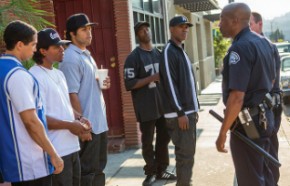Reality rap

It’s impossible to watch Straight Outta Compton and not think of Ferguson or #BlackLivesMatter. But this is not explicitly a movie about politics or racial justice. It’s a music biopic about the rap group N.W.A. (Niggaz Wit Attitudes), and at heart it’s about creativity, art, and the quest to say or do something real.
Perfecting a style its members called reality rap (which came to be know as gangsta rap or hardcore rap), N.W.A. shook up the music industry and the broader culture with songs about the experiences of young, poor black males in the inner city back when “inner city” was code for urban blight and social disintegration (not lofts and gentrification). Against critiques that they were glorifying violence, members of N.W.A. insisted that they were simply reflecting the extreme inequality, poverty, police violence, and gang violence that the musicians experienced growing up in Compton, California, in the Reagan era.
Read our latest issue or browse back issues.
Straight Outta Compton thrums with the energy of this controversy. The main characters are introduced in tight narrative set pieces that give us glimpses of both Compton life and the characters’ unique personalities: Eric Wright (“Easy-E,” played by Jason Mitchell) is quick on his feet, dodging bullets in a drug house. Andre Young (“Dr. Dre,” played by Corey Hawkins) wears a sparkling tux jacket as he mixes beats at a local club for a boss who doesn’t appreciate his genius. O’Shea Jackson (“Ice Cube,” played by O’Shea Jackson Jr.) is curled over a tattered black-and-white composition book as he pens rap lyrics on the bus. Their stories intertwine as they experiment with the idea of doing something “new and big.” When they enter the studio to record what will become their first hit, “Boyz-n-the-Hood,” I was on the edge of my seat.
It’s difficult to make a movie about making music. It’s like making a movie about a great scientific breakthrough, with much of the action happening in people’s heads, under a microscope, or in the headphones of a mixing board. Straight Outta Compton meets this challenge. In the studio scenes—the highlight of the film—we sense the palpable excitement of the group as the men feel their way into a signature sound and style of verse. By the time N.W.A. plays to packed crowds across middle America, these musicians are masters of their craft and fully aware of the punch they are packing.
Many have chastised the film for excising the misogyny, homophobia, and violence against women that are part of the lyrics and lives of N.W.A. Ice Cube and Dr. Dre helped write the script, and longtime collaborator F. Gary Gray directed it. Yes, the movie suffers at times from self-importance and a tinge of hagiography. And yes, it would be a better movie and a more honest appraisal of N.W.A.-style rap if it had confronted the dark side of the genre.
But even if the dark side were represented, it might have been presented badly. We Are Your Friends, a film that opened a couple of weeks after Straight Outta Compton, is the story of a group of kids from the wrong side of the tracks who want to make it as DJs in the electronic dance music scene (EDM). It is plodding and clichéd, and thrives on male aggression, drug culture, and naked women. But no one is going to call white male star Zac Efron a thuggish brute when he loses himself in a drug high and grinds his sculpted body against a half-dozen women in bikinis.
Straight Outta Compton is aware of the double standard. Instead of obscene lyrics or misogyny, the central controversy in the film is the group’s song “Fuck Tha Police.” As part scathing depiction of white supremacist policing practices and part violent revenge fantasy, the song incited righteous indignation from mostly white, often Christian critics. Focus on the Family pressured the FBI to issue a warning letter to the group. Several states tried to make it illegal to sell the album to minors.
The movie uses the controversy to great effect by allowing the group to clarify the principles of its art and to take a stand as artists first and foremost. It lifts up its art as a form of social protest.
Perhaps if more people had listened to “Fuck Tha Police” as an honest reflection of the state of black and brown relationships with law enforcement, we’d be further along in confronting systemic racism. As an artistic genre, reality rap is a great legacy—one that shows us a reality we haven’t confronted, much less dealt with.
Straight Outta Compton could use a dose of reality about its own history. But it’s a rare movie in depicting the stakes of prophetic, controversial art without losing sight of artistic process.






